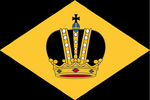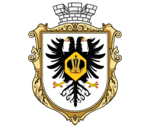Empire of Aberfalia
This article refers to a micronation or element of micronationalism which is defunct and no longer exists. You can help make the article reflect that or ask on the talk page for further information. |
Empire of Aberfalia | |
|---|---|
| Motto: "Victory through negotiation" | |
| Anthem: Cornwall my home | |
| Capital and largest city | Aberfal |
| Official languages | English, Cornish |
| Recognised national languages | English |
| Demonym(s) | Aberfalian |
| Government | Constitutional monarchy |
• Emperor of Aberfalia | Roadrunner I |
• Crown prince | Kenneth V |
• King of Ainsworth | Fynley I |
| Legislature | Absolute |
| Establishment | |
• Establishment of Fesmar | March 15 2018 |
• Establishment of the First Fesmarian Empire | March 17 2018 |
• Establishment of the Second Fesmarian Empire | July 20 2018 |
• Signing of the Act of Union | December 20 2020 |
| Population | |
• 2020 estimate | unknown |
| HDI (2018) | 0.918 very high |
| Currency | Pound sterling |
| Time zone | UTC |
| Date format | dd-mm-yyyy |
| Driving side | left |
Aberfalia, officially known as the Empire of Aberfalia, is an autonomous territorial entity which claims to be a sovereign state but is more commonly referred to as a Micronation by external observers. Founded in the picturesque region known as Cornwall, founded in December 2020, Aberfalia exists as the combination of multiple entities, commonly refered to as the Fesmarian nations. Aberfalia is commonly known for its attempts to revive the culture of the Fesmarian empires, focusing on adapting a continued trend of rituals and traditions into one cohesive entity.
Etymology
The name Aberfalia originates from a Latinised variant of the Cornish language word for the harbour town of Falmouth which is location for the capital of the empire. Other regional names such as Glynawan also originate from geographical location, there remain two notable exemptions to the convention of geographic naming. The first of these exemptions is the kingdom of Ainsworth, which acts as a ceremonial vassal position below the Emperor, Ainsworth originates from the name of its founder, Fynley I Ainsworth and the Ainsworth dynasty. The second exemption is the kingdom of Stormhold, which was named after the previously independent kingdom of Stormhold.
National Symbols
Fesmar and the subsequent Aberfalia have had many national flags throughout their turbulent history, throughout this history style and complexity in designs have varied, however there has remained a small selection of re-occurring symbols. Many symbols are used within the nation, ranging from newly introduced symbols such as the crown of Kernow, to the symbols of the first Fesmarian empire. One of the earliest symbols to be adopted by both Fesmar and Aberfalia is that of the Fydtroust dynasty.
Fydtroust Arrow
By far the earliest symbol in Fesmarian history, the arrow has been an integral part of Fesmarian design since the beginning of the first empire. The symbol was first derived from a cloth headband worn by the Emperor to signify his political status, with the arrow representing the forward progression of Fydtroust views.

National Flag
The national flag of Aberfalia originates in the national flag of the first Fesmarian empire. The colour choice was made in part because of the use of the colours black and yellow being common on most Fesmarian and associated states. The design choice was made to emulate the original diamond flag design used in early Fesmarian designs, although replacing the commonly used arrow with that of a more neutral and less dynastic crown. The depicted crown is unofficially named "the crown of Kernow" in reference to the common practice of using the term Kernow (which is the Cornish word for Cornwall), which has become a key sticking point in iconography and imagery amongst the associated nations.

